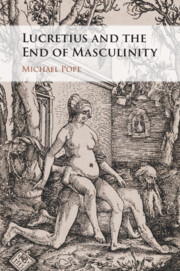Book contents
- Lucretius and the End of Masculinity
- Lucretius and the End of Masculinity
- Copyright page
- Contents
- Acknowledgments
- Abbreviations
- Chapter 1 Odd Men Out
- Chapter 2 Humbled Beginnings
- Chapter 3 Nature’s Assault upon the Senses
- Chapter 4 Death: The Hole That Gapes for All
- Chapter 5 The Ties That Bind
- Chapter 6 Vir Recreandus
- Bibliography
- Index
- Subject Index
Chapter 5 - The Ties That Bind
Published online by Cambridge University Press: 11 May 2023
- Lucretius and the End of Masculinity
- Lucretius and the End of Masculinity
- Copyright page
- Contents
- Acknowledgments
- Abbreviations
- Chapter 1 Odd Men Out
- Chapter 2 Humbled Beginnings
- Chapter 3 Nature’s Assault upon the Senses
- Chapter 4 Death: The Hole That Gapes for All
- Chapter 5 The Ties That Bind
- Chapter 6 Vir Recreandus
- Bibliography
- Index
- Subject Index
Summary
“The Ties that Bind,” takes us in a new direction as we begin to explore Lucretius’ curative efforts toward his male audience. Quite naturally then, we train our focus on the famous honey-rimmed cup of medicine metaphor of 1.921–50 (4.1–25). We find that the verses present a figure denser than the simple doctor-patient-medicine schema. Rather surprisingly, Lucretius has woven into the image a complex set of allusions to mythical female characters. In overlapping ways, Lucretius identifies his authorial voice with Circe, Helen, and the Sirens as he seeks to seduce, drug, and divert his audience away from what they might imagine to be their dearest goals in life. Lucretius reveals that the emasculating web of deceit he spins becomes a safety net to rescue his audience from the trap of self-delusion and superstition in the face of nature’s laws.
- Type
- Chapter
- Information
- Lucretius and the End of Masculinity , pp. 120 - 146Publisher: Cambridge University PressPrint publication year: 2023

